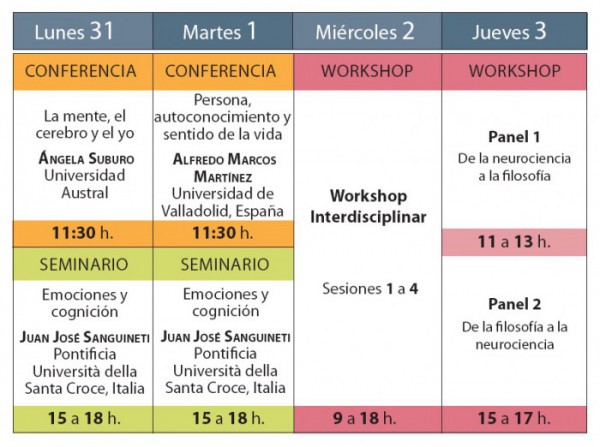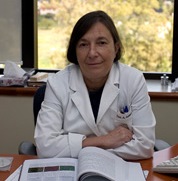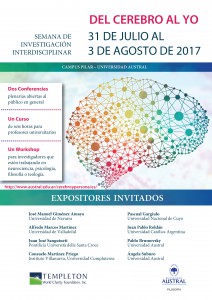 Throughout the Weeks, the following activities will be organized:
Throughout the Weeks, the following activities will be organized:
- Two keynote talks open to the general public.
- A 6-hour course for academics.
- A 2-day workshop for researchers working on neuroscience, cognitive science, philosophy or theology.
The total number of participants in the workshops should not exceed 25-30, including speakers and audience. We will issue a call addressed to Latin American PhD candidates and scholars who would like to participate in the Week. We will select the best three applications according to the candidates’ proven interest in the topics and their academic curricula, and offer them a grant of up to $ 1,500 to cover travel and lodging expenses. Participation in the workshop will be only by invitation. Invited researchers will have interdisciplinary expertise, in order to ensure an environment where all participants understand the terminology used in the different disciplines. All participants will receive a selection of recent bibliography (two or three papers for each question) and will be asked to read it in advance, since it will trigger the discussions.
Details of the workshops, including themes of each session are described below:
INTERDISCIPLINARY RESEARCH WEEK 2017
“FROM THE BRAIN TO THE SELF”
(JULY 31 – AUGUST 3 – UNIVERSIDAD AUSTRAL)
KEY-NOTE TALK: “THE MIND, THE BRAIN AND THE SELF”
Ángela Suburo has a PhD in Medicine (Universidad de Buenos Aires), and she specializes in neurosciences. She is a Senior Researcher at the National Council of Scientific and Technological Research (CONICET) and she is also Professor of Cellular and Molecular Medicine at Universidad Austral. She is member of several associations: Association for Research in Vision and Ophthalmology (Chairperson of the Retinal Cell Biology section), Society for Neuroscience, International Society for Eye Research, Asociación de Investigación en Visión y Oftalmología, Sociedad Argentina de Neuroquímica and Sociedad Argentina de Investigación Clínica. She leads a group of young researchers dedicated to the study of neurodegenerative diseases in the retina and in the brain. She has written numerous articles. In 2011 her work “Mecanismos de protección de los fotorreceptores: papel de los glucocorticoides” received the Nocetti and Tiscornia Prize, awarded by the National Academy of Medicine (Buenos Aires).
KEY-NOTE TALK: “PERSON, SELF-KNOWLEDGE AND THE MEANING OF LIFE”
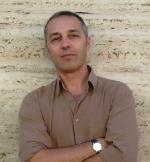
Alfredo F. Marcos Martínez holds a PhD in Philosophy from the University of Barcelona and is Professor of Philosophy of Science at the University of Valladolid. He has been a visiting researcher at Cambridge and Rome. He has taught and lectured at numerous universities in Spain, Colombia, Italy, Mexico, France, Argentina and Poland. He lectures on history and philosophy of science, bioethics, science communication. He has published a dozen books and more than sixty articles and chapters on the history and philosophy of science, environmental ethics, bioethics, philosophy of biology, science communication and Aristotelian studies. He coordinates the philosophy of science section of the journal Investigación y Ciencia. He has been director of the department of philosophy at the University of Valladolid. He has been member of the bioethics committees of several hospitals. He currently coordinates the Interuniversity PhD in Logic and Philosophy of Science.
COURSE: “EMOTIONS AND COGNITION”
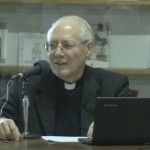 Juan José Sanguineti has a PhD in Philosophy (Universidad de Navarra, Spain). He is Professor of Philosophy of Knowledge at the School of Philosophy at the Pontifical University of the Holy Cross (Rome). He has published fifteen books and nearly a hundred scientific articles on theory of knowledge, philosophy of science, philosophy of nature, philosophy of mind and the neurosciences. He was Director of the Scientific Committee of the Project STOQ III (Rome, 2007-2010, University of the Holy Cross, area of Neurosciences). He regularly delivers graduate courses and seminars at different universities in Latin America. He is ordinary member of the Pontifical Roman Academy of Saint Thomas and of the Sociedad Tomista Argentina. He is a member of the scientific committee of the journal Acta Philosophica (University of the Holy Cross).
Juan José Sanguineti has a PhD in Philosophy (Universidad de Navarra, Spain). He is Professor of Philosophy of Knowledge at the School of Philosophy at the Pontifical University of the Holy Cross (Rome). He has published fifteen books and nearly a hundred scientific articles on theory of knowledge, philosophy of science, philosophy of nature, philosophy of mind and the neurosciences. He was Director of the Scientific Committee of the Project STOQ III (Rome, 2007-2010, University of the Holy Cross, area of Neurosciences). He regularly delivers graduate courses and seminars at different universities in Latin America. He is ordinary member of the Pontifical Roman Academy of Saint Thomas and of the Sociedad Tomista Argentina. He is a member of the scientific committee of the journal Acta Philosophica (University of the Holy Cross).
WORKSHOP “FROM THE BRAIN TO THE SELF”
The aim of the workshop is to promote an interdisciplinary high-level research in six working sessions. The question that guides each session will be studied by a couple of scholars from different disciplines. The first speaker will present the status quaestionis, then propose a possible answer from his discipline, opening the game to the presentation of a complementary vision from the perspective of the other speaker. The second speaker will assess the contributions from the first intervention, propose a possible answer from his discipline and open the session to questions and comments from all participants.
Session 1: How do neuroscience, psychology and philosophy contribute to our knowledge of the human being?
Speakers: Alfredo Marcos (University of Valladolid) and José Eduardo Moreno (Universidad Católica Argentina).
Read more.
Session 2: How compelling is the distinction between the first- and the third-person perspectives as an argument against naturalism?
Speakers: Juan José Sanguineti (Pontificia Università della Santa Croce) and Angela Suburo (Austral University).
Read more.
Session 3: Can self-understanding be preserved despite cognitive dysfunctions?
Read more.
Session 4: Is the ‘self’ an adequate bridge between the results of neuroscience and the notion of person?
Speakers: Juan Pablo Roldán (University of the North Santo Tomás de Aquino) and Pablo Brumovsky (Austral University).
Read more.
Session 5 – Round table: Can philosophy provide an interpretive framework to neuroscientific studies?
Speakers: Jorge T. Insúa (Universidad de Buenos Aires/Universidad Austral), Pascual Gargiulo (Universidad Nacional de Cuyo) and Juan Esteban Erquiaga (Hospital Austral).
Read more.
Session 6 – Round table: Which neuroscientific findings enlighten in a novel way our understanding of the human person?
Speakers: Ivana Anton Mlinar (Universidad Nacional de Cuyo), Agustina Lombardi (Universidad Austral) and Juan Pablo Roldán (Universidad del Norte Santo Tomás de Aquino).
Read more.

